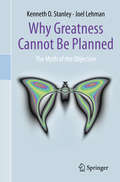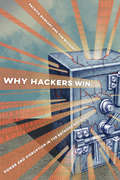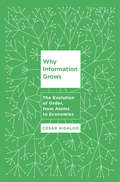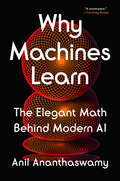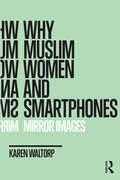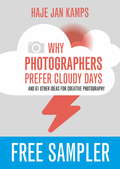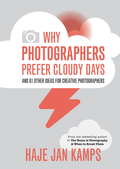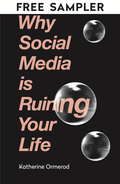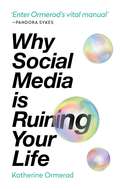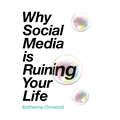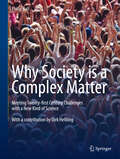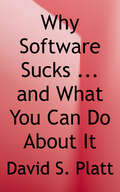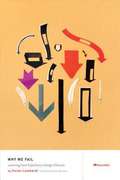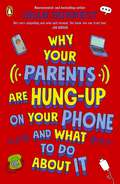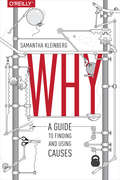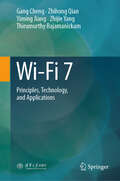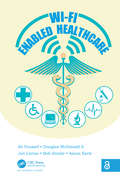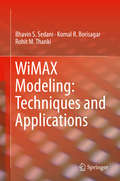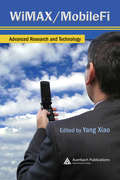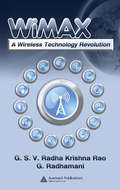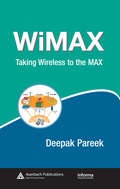- Table View
- List View
Why Greatness Cannot Be Planned
by Kenneth O. Stanley Joel LehmanWhy does modern life revolve around objectives? From how science is funded, to improving how children are educated -- and nearly everything in-between -- our society has become obsessed with a seductive illusion: that greatness results from doggedly measuring improvement in the relentless pursuit of an ambitious goal. In Why Greatness Cannot Be Planned, Stanley and Lehman begin with a surprising scientific discovery in artificial intelligence that leads ultimately to the conclusion that the objective obsession has gone too far. They make the case that great achievement can't be bottled up into mechanical metrics; that innovation is not driven by narrowly focused heroic effort; and that we would be wiser (and the outcomes better) if instead we whole-heartedly embraced serendipitous discovery and playful creativity. Controversial at its heart, yet refreshingly provocative, this book challenges readers to consider life without a destination and discovery without a compass.
Why Hackers Win: Power and Disruption in the Network Society
by Patrick Burkart Tom McCourtWhen people think of hackers, they usually think of a lone wolf acting with the intent to garner personal data for identity theft and fraud. But what about the corporations and government entities that use hacking as a strategy for managing risk? Why Hackers Win asks the pivotal question of how and why the instrumental uses of invasive software by corporations and government agencies contribute to social change. Through a critical communication and media studies lens, the book focuses on the struggles of breaking and defending the “trusted systems” underlying our everyday use of technology. It compares the United States and the European Union, exploring how cybersecurity and hacking accelerate each other in digital capitalism, and how the competitive advantage that hackers can provide corporations and governments may actually afford new venues for commodity development and exchange. Presenting prominent case studies of communication law and policy, corporate hacks, and key players in the global cybersecurity market, the book proposes a political economic model of new markets for software vulnerabilities and exploits, and clearly illustrates the social functions of hacking.
Why Information Grows: The Evolution of Order, from Atoms to Economies
by César HidalgoWhat is economic growth? And why, historically, has it occurred in only a few places? Previous efforts to answer these questions have focused on institutions, geography, finances, and psychology. But according to MIT's antidisciplinarian César Hidalgo, understanding the nature of economic growth demands transcending the social sciences and including the natural sciences of information, networks, and complexity. To understand the growth of economies, Hidalgo argues, we first need to understand the growth of order. At first glance, the universe seems hostile to order. Thermodynamics dictates that over time, order--or information--disappears. Whispers vanish in the wind just like the beauty of swirling cigarette smoke collapses into disorderly clouds. But thermodynamics also has loopholes that promote the growth of information in pockets. Although cities are all pockets where information grows, they are not all the same. For every Silicon Valley, Tokyo, and Paris, there are dozens of places with economies that accomplish little more than pulling rocks out of the ground. So, why does the US economy outstrip Brazil's, and Brazil's that of Chad? Why did the technology corridor along Boston's Route 128 languish while Silicon Valley blossomed? In each case, the key is how people, firms, and the networks they form make use of information. Seen from Hidalgo's vantage, economies become distributed computers, made of networks of people, and the problem of economic development becomes the problem of making these computers more powerful. By uncovering the mechanisms that enable the growth of information in nature and society, Why Information Grows lays bear the origins of physical order and economic growth. Situated at the nexus of information theory, physics, sociology, and economics, this book propounds a new theory of how economies can do not just more things, but more interesting things.
Why Machines Learn: The Elegant Math Behind Modern AI
by Anil AnanthaswamyA rich, narrative explanation of the mathematics that has brought us machine learning and the ongoing explosion of artificial intelligence Machine learning systems are making life-altering decisions for us: approving mortgage loans, determining whether a tumor is cancerous, or deciding if someone gets bail. They now influence developments and discoveries in chemistry, biology, and physics—the study of genomes, extrasolar planets, even the intricacies of quantum systems. And all this before large language models such as ChatGPT came on the scene. We are living through a revolution in machine learning-powered AI that shows no signs of slowing down. This technology is based on relatively simple mathematical ideas, some of which go back centuries, including linear algebra and calculus, the stuff of seventeenth- and eighteenth-century mathematics. It took the birth and advancement of computer science and the kindling of 1990s computer chips designed for video games to ignite the explosion of AI that we see today. In this enlightening book, Anil Ananthaswamy explains the fundamental math behind machine learning, while suggesting intriguing links between artificial and natural intelligence. Might the same math underpin them both? As Ananthaswamy resonantly concludes, to make safe and effective use of artificial intelligence, we need to understand its profound capabilities and limitations, the clues to which lie in the math that makes machine learning possible.
Why Muslim Women and Smartphones: Mirror Images (Criminal Practice Ser.)
by Karen WaltorpUsing an assemblage approach to study how Muslim women in Norrebro, Denmark use their phones, Karen Waltorp examines how social media complicates the divide between public and private in relation to a group of people who find this distinction of utmost significance. Building on years of ethnographic fieldwork, Waltorp's ethnography reflects the trust and creativity of her relationships with these women which in turn open up nuanced discussions about both the subject at hand and best practice in conducting anthropological research. Combining rich ethnography with theoretical contextualization, Waltorp's book alternates between ethnography and analysis to illuminate a thoroughly modern community, and reveals the capacity of image-making technology to function as an infrastructure for seeing, thinking and engaging in fieldwork as an anthropologists. Waltorp identifies a series of important issues around anthropological approaches to new media, contributing to new debates around the anthropology of automation, data and self-tracking.
Why Photographers Prefer Cloudy Days: Surprising And Inspiring Tips For Photographers
by Haje Jan Kamps**FREE SAMPLER** There's no one secret to taking beautiful photos, but good photographers build up a series of useful bits of know-how. They know that clouds, far from ruining a photo, give a great soft natural light for portraits. They know that unusual angles draw the eye, and that their feet are just as effective as a zoom lens.This book packs 62 of the most important creative ideas into one easy-to-read location, beautifully presented with example photos. None of these ideas need an expensive camera, fancy lens or a over-priced flash. The purpose of this book is to help you tell stories with your camera, whatever the camera.Whether you're photographing that perfect sunset or your morning coffee, Why Photographers Prefer Cloudy Days will show you how to capture it to best effect, whether you want it to look great on your Instagram, or amazing on your wall.
Why Photographers Prefer Cloudy Days: Surprising And Inspiring Tips For Photographers
by Haje Jan KampsThere's no one secret to taking beautiful photos. But good photographers do have a few tricks up theirsleeves... They know that clouds, far from ruining a photo, give a great soft natural light for portraits. They know that unusual angles draw the eye, and that their feet are just as effective as a zoom lens.This book packs 62 of the most important creative ideas into one place. Beautifully presented, easy-to-read and packed with example photos. None of these ideas need an expensive camera, fancy lens or a over-priced flash. The purpose of this book is to help you tell stories with your camera (or phone).Whatever you want to shoot, Why Photographers Prefer Cloudy Days is packed full of ideas to inspire you, and tips that will help you take better, more original photos.
Why Photographers Prefer Cloudy Days: and 61 Other Ideas for Creative Photography
by Haje Jan KampsThere's no one secret to taking beautiful photos. But good photographers do have a few tricks up theirsleeves... They know that clouds, far from ruining a photo, give a great soft natural light for portraits. They know that unusual angles draw the eye, and that their feet are just as effective as a zoom lens.This book packs 62 of the most important creative ideas into one place. Beautifully presented, easy-to-read and packed with example photos. None of these ideas need an expensive camera, fancy lens or a over-priced flash. The purpose of this book is to help you tell stories with your camera (or phone).Whatever you want to shoot, Why Photographers Prefer Cloudy Days is packed full of ideas to inspire you, and tips that will help you take better, more original photos.
Why Social Media is Ruining Your Life
by Katherine Ormerod**FREE SAMPLER**'This book is a call to arms from the eye of the storm'- Emma Gannon, author of The Multi Hyphen MethodDo you ever obsess about your body? Do you lie awake at night, fretting about the state of your career? Does everyone else's life seem better than yours? Does it feel as if you'll never be good enough? Get a first glimpse of Why Social Media is Ruining Your Life with this exclusive free sampler, and learn how to tackle head on the pressure cooker of comparison and unreachable levels of perfection that social media has created in our modern world.In this book, Katherine Ormerod meets the experts involved in curating, building and combating the most addictive digital force humankind has ever created. From global influencers - who collectively have over 10 million followers - to clinical psychologists, plastic surgeons and professors, Katherine uncovers how our relationship with social media has rewired our behavioural patterns, destroyed our confidence and shattered our attention spans.Why Social Media is Ruining Your Life is a call to arms that will provide you with the knowledge, tactics and weaponry you need to find a more healthy way to consume social media and reclaim your happiness.
Why Social Media is Ruining Your Life
by Katherine OrmerodDo you ever obsess about your body? Do you lie awake at night, fretting about the state of your career?Does everyone else's life seem better than yours? Does it feel as if you'll never be good enough? Why Social Media is Ruining Your Life tackles head on the pressure cooker of comparison and unreachable levels of perfection that social media has created in our modern world.In this book, Katherine Ormerod meets the experts involved in curating, building and combating the most addictive digital force humankind has ever created. From global influencers - who collectively have over 10 million followers - to clinical psychologists, plastic surgeons and professors, Katherine uncovers how our relationship with social media has rewired our behavioural patterns, destroyed our confidence and shattered our attention spans.Why Social Media is Ruining Your Life is a rallying cry that will provide you with the knowledge, tactics and weaponry you need to find a more healthy way to consume social media and reclaim your happiness.Reviews for Why Social Media is Ruining Your Life:'This book is a call to arms from the eye of the storm'- Emma Gannon, author of The Multi-Hyphen Method'Enter Ormerod's vital manual, which will help you navigate social media and turn it not into a weapon, but a useful tool' - Pandora Sykes
Why Social Media is Ruining Your Life
by Katherine Ormerod'This book is a call to arms from the eye of the storm'- Emma Gannon, author of The Multi-Hyphen Method'Enter Ormerod's vital manual, which will help you navigate social media and turn it not into a weapon, but a useful tool' - Pandora SykesDo you ever obsess about your body? Do you lie awake at night, fretting about the state of your career? Does everyone else's life seem better than yours? Does it feel as if you'll never be good enough? Why Social Media is Ruining Your Life tackles head on the pressure cooker of comparison and unreachable levels of perfection that social media has created in our modern world.In this book, Katherine Ormerod meets the experts involved in curating, building and combating the most addictive digital force humankind has ever created. From global influencers - who collectively have over 10 million followers - to clinical psychologists, plastic surgeons and professors, Katherine uncovers how our relationship with social media has rewired our behavioural patterns, destroyed our confidence and shattered our attention spans.Why Social Media is Ruining Your Life is a rallying cry that will provide you with the knowledge, tactics and weaponry you need to find a more healthy way to consume social media and reclaim your happiness.
Why Social Media is Ruining Your Life
by Katherine Ormerod'This book is a call to arms from the eye of the storm'- Emma Gannon, author of The Multi-Hyphen Method'Enter Ormerod's vital manual, which will help you navigate social media and turn it not into a weapon, but a useful tool' - Pandora SykesDo you ever obsess about your body? Do you lie awake at night, fretting about the state of your career? Does everyone else's life seem better than yours? Does it feel as if you'll never be good enough? Why Social Media is Ruining Your Life tackles head on the pressure cooker of comparison and unreachable levels of perfection that social media has created in our modern world.In this book, Katherine Ormerod meets the experts involved in curating, building and combating the most addictive digital force humankind has ever created. From global influencers - who collectively have over 10 million followers - to clinical psychologists, plastic surgeons and professors, Katherine uncovers how our relationship with social media has rewired our behavioural patterns, destroyed our confidence and shattered our attention spans.Why Social Media is Ruining Your Life is a rallying cry that will provide you with the knowledge, tactics and weaponry you need to find a more healthy way to consume social media and reclaim your happiness.(p) 2018 Octopus Publishing Group
Why Society is a Complex Matter
by Philip BallSociety is complicated. But this book argues that this does not place it beyond the reach of a science that can help to explain and perhaps even to predict social behaviour. As a system made up of many interacting agents - people, groups, institutions and governments, as well as physical and technological structures such as roads and computer networks - society can be regarded as a complex system. In recent years, scientists have made great progress in understanding how such complex systems operate, ranging from animal populations to earthquakes and weather. These systems show behaviours that cannot be predicted or intuited by focusing on the individual components, but which emerge spontaneously as a consequence of their interactions: they are said to be 'self-organized'. Attempts to direct or manage such emergent properties generally reveal that 'top-down' approaches, which try to dictate a particular outcome, are ineffectual, and that what is needed instead is a 'bottom-up' approach that aims to guide self-organization towards desirable states. This book shows how some of these ideas from the science of complexity can be applied to the study and management of social phenomena, including traffic flow, economic markets, opinion formation and the growth and structure of cities. Building on these successes, the book argues that the complex-systems view of the social sciences has now matured sufficiently for it to be possible, desirable and perhaps essential to attempt a grander objective: to integrate these efforts into a unified scheme for studying, understanding and ultimately predicting what happens in the world we have made. Such a scheme would require the mobilization and collaboration of many different research communities, and would allow society and its interactions with the physical environment to be explored through realistic models and large-scale data collection and analysis. It should enable us to find new and effective solutions to major global problems such as conflict, disease, financial instability, environmental despoliation and poverty, while avoiding unintended policy consequences. It could give us the foresight to anticipate and ameliorate crises, and to begin tackling some of the most intractable problems of the twenty-first century.
Why Software Sucks...and What You Can Do About It
by David S. PlattThis non-technical book discusses the annoyances and dangers we encounter every day when using computers. <p><p>Written with delightful wit and humor, as well as the insight of an experienced insider, it rips into the design of software much as Atul Gawande's Complications exposed the practice of medicine. Its basic message to ordinary people having problems learning or using their software is this: It's not your fault! It's not because you're dumb! <p><p>Aimed primarily at casual users of software, the book tells readers what they should expect from their software and how to make their voices heard so that they receive it. The book explains the mindset of the programmers behind our software: how they're different from the rest of us, and how they're similar. It looks at the decisions programmers have to make in building their system or application, and why they make the choices that they do - choices that too often leave us scratching our heads, or worse. <p><p>But the book is not just a funny rant. It shows what all of us ordinary users need to know, and can do, to make our interactions with computers less frustrating. You needn't become a programmer to become a smarter and cooler user. You do need to read this book.
Why We Fail
by Victor LombardiJust as pilots and doctors improve by studying crash reports and postmortems, experience designers can improve by learning how customer experience failures cause products to fail in the marketplace. Rather than proselytizing a particular approach to design, Why We Fail holistically explores what teams actually built, why the products failed, and how we can learn from the past to avoid failure ourselves.
Why Your Parents Are Hung-Up on Your Phone and What To Do About It
by Dean Burnett'Dean Burnett is the first old person who understands phones' Eleven-year-old Dermot, quoted in The Times'A wonderfully useful book, told with Dean Burnett's trademark wit and wisdom' - Adam Kay on Why Your Parents Are Driving You up the Wall“Can you get off your phone/ PS5/ Xbox!? NOW!” - Your parents (probably)I bet that you and your parents argue about phones.Maybe you want one, but your parents don’t agree? Or maybe you do have a phone, but your parents think you use it too much. Or even make you leave it downstairs at night when you want to scroll before sleep.Either way, the result is: arguments. Between you and your parents. About phones.Meet brain scientist and bestselling author Dean Burnett. He’ll show you why your parents are sometimes wrong about phones (and why, annoyingly, they can be a bit right), how you can both understand them a bit better and how you can stop arguing about them. You’ll learn about:Why turning off TikTok can be so hardHow video games can change your brain for the betterHow Snapchat can make us sad (and lots of other complicated feelings)Because screens can be a good thing. And a bad thing. But they’re definitely not worth getting hung up about.
Why: A Guide to Finding and Using Causes
by Samantha KleinbergCan drinking coffee help people live longer? What makes a stock’s price go up? Why did you get the flu? Causal questions like these arise on a regular basis, but most people likely have not thought deeply about how to answer them.This book helps you think about causality in a structured way: What is a cause, what are causes good for, and what is compelling evidence of causality? Author Samantha Kleinberg shows you how to develop a set of tools for thinking more critically about causes. You’ll learn how to question claims, identify causes, make decisions based on causal information, and verify causes through further tests.Whether it’s figuring out what data you need, or understanding that the way you collect and prepare data affects the conclusions you can draw from it, Why will help you sharpen your causal inference skills.
Wi-Fi 7: Principles, Technology, and Applications
by Gang Cheng Zhihong Qian Yiming Jiang Zhijie Yang Thirumurthy RajamanickamThis Wi-Fi 7 technology book serves as an essential and comprehensive professional reference for the academics and industry professionals, covering the entire Wi-Fi series across various generations. It offers a primary focus on the latest advancements in industrial Wi-Fi 7 principles and specifications. Additionally, the book provides valuable insights into innovative strategies for Wi-Fi 7 product development strategies, testing methodologies, and diverse applications across industrial and home environments. It serves as a practical resource for those planning to adopt Wi-Fi 7 technology in the design and development processes. By reading this book, you will not only gain insights into the state-of-the-art of Wi-Fi 7 technology, but also develop a deep understanding of the origins, the process of developing Wi-Fi 7 products, various applications and solutions where Wi-Fi 7 can be utilized, and the current state of the industry in relation to Wi-Fi 7 technology compared to the other wireless technologies. Each section of this book follows a systematic approach, beginning with an introduction to the technology concept and offering numerous concrete examples for illustration purpose. Abundant diagrams and pictures have been included in the book’s design to facilitate clear and quick comprehension of the topics for readers.
Wi-Fi Enabled Healthcare
by Ali Youssef Douglas McDonald II Jon Linton Bob Zemke Aaron EarleFocusing on the recent proliferation of Wi-Fi in hospital systems, this book explains how Wi-Fi is transforming clinical work flows and infusing new life into the types of mobile devices being implemented in hospitals. Drawing on years of consulting with hospitals in the US and abroad, and with first-hand experiences from one of the largest healthcare systems in the United States, it covers the key areas associated with wireless network design, security, and support. Reporting on cutting-edge developments and emerging standards in Wi-Fi technologies, the book explores security implications for each device type. It covers real-time location services and emerging trends in cloud-based wireless architecture.
WiFi signal-based user authentication (SpringerBriefs in Computer Science)
by Jiadi Yu Linghe Kong Hao KongAs a privacy-preserving and illumination-robust manner, WiFi signal-based user authentication has become a new direction for ubiquitous user authentication to protect user privacy and security. It gradually turns into an important option for addressing the security concern of IoT environment. However, due to the limited sensing capability of WiFi signals and wide application scenarios, WiFi signal-based user authentication suffers from practical issues of diversified behaviors and complex scenarios. Therefore, it is necessary to address the issues and build integrated systems for user authentication using WiFi signals. In this book, the development and progress of WiFi signal-based user authentication systems in extensive scenarios are presented, which provides a new direction and solution for ubiquitous security and privacy protection. This book gives strong motivation of leveraging WiFi signals to sense human activities for user authentication, and presents the key issues of WiFi-based user authentication in diversified behaviors and complex scenarios. This book provides the approaches for digging WiFi signals to sense human activities and extract features, realizing user authentication under fine-grained finger gestures, undefined body gestures, and multi-user scenarios. State-of-the-art researches and future directions involved with WiFi signal-based user authentication are presented and discussed as well. This book will benefit researchers and practitioners in the related field.
WiMAX Modeling: Techniques and Applications
by Rohit M. Thanki Komal R. Borisagar Bhavin S. SedaniThis book provides information about wireless systems and WIMAX modeling. The authors provide various techniques for the WiMAX systems such as antenna diversity and Alamouti coding. The performance of these systems is tested using various types of data and the results of systems are presented and discussed. Additional topics include WiMAX simulation using diversity techniques and real time WiMAX system modeling. The book pertains to researchers, academics, students, and professionals.Provides information about wireless system modeling and WiMAX systems;Presents WiMAX system modeling using antenna diversity techniques and the Alamouti coding scheme;Includes real time WiMAX system modeling for speech signal and digital images.
WiMAX Network Planning and Optimization (Wireless Networks and Mobile Communications)
by Yan ZhangThis book offers a comprehensive explanation on how to dimension, plan, and optimize WiMAX networks. The first part of the text introduces WiMAX networks architecture, physical layer, standard, protocols, security mechanisms, and highly related radio access technologies. It covers system framework, topology, capacity, mobility management, handoff m
WiMAX/MobileFi: Advanced Research and Technology
by Yang XiaoWiMAX is bringing about a worldwide revolution in broadband wireless access, including both fixed and mobile handsets. The IEEE 802.16 working group standardized most aspects of WiMAX signaling messages. However, several algorithms were left unspecified opening the door for innovations in protocol engineering for 802.16/802.20-based broadband wirel
WiMAX: A Wireless Technology Revolution
by G. Radhamani G.S.V. Radha RaoExamining the technology's global development and deployment activities, WiMAX: A Wireless Technology Revolution presents its unique features and evaluates its revolutionary approach. The book covers the mission, product, and services of WiMAX, as well as specific features such as security and mobility. It discusses the implementation of the IEEE 802.16 standard and also explores how WiMax stacks up to 3G and 4G and the economic and opportunity costs. This reference also analyzes the future prospects of WiMAX and its contribution to the wireless and mobile communication technology field. It is a must-have resource for those who are either intrigued or involved with this standards-based technology.
WiMAX: Taking Wireless to the MAX (Informa Telecoms & Media)
by Deepak PareekWith market value expected to reach $5 billion by 2007 and the endorsement of some of the biggest names in telecommunications, World Interoperability for Microwave Access (WiMAX) is poised to change the broadband wireless landscape. But how much of WiMAX's touted potential is merely hype? Now that several pre-WiMAX networks have been deployed, what
